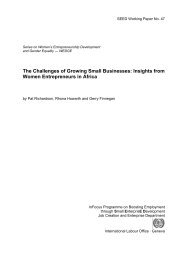manual: women workers' rights and gender equality - International ...
manual: women workers' rights and gender equality - International ...
manual: women workers' rights and gender equality - International ...
Create successful ePaper yourself
Turn your PDF publications into a flip-book with our unique Google optimized e-Paper software.
Step 3<br />
• Summarize the main points discussed during the session<br />
Notes for the trainer<br />
The most recent <strong>and</strong> most widely accepted definition of trafficking is the one included in the<br />
Palermo Protocol on Trafficking (2000). It is as follows:<br />
• 'Trafficking in persons' means the recruitment, transportation, transfer, harbouring or receipt of<br />
persons, by means of the threat or use of force or other forms of coercion, of abduction, of<br />
fraud, of deception, of the abuse of power or of a position of vulnerability or of the giving or<br />
receiving of payments or benefits to achieve the consent of a person, for the purpose of<br />
exploitation. Exploitation shall include, at a minimum, 'the exploitation of the prostitution of<br />
others or other forms of sexual exploitation, forced labour or services, slavery or practices<br />
similar to slavery, servitude or the removal of organs'.<br />
• The consent of a trafficking victim to the exploitation shall be irrelevant where any of the<br />
means mentioned above, such as the abuse of power, have been used.<br />
• The recruitment, transportation, transfer, harbouring or receipt of a child for the purpose of<br />
exploitation shall be considered “trafficking in persons” even if this does not involve any of the<br />
means mentioned above.<br />
• “Child” shall mean any person less than eighteen years of age.<br />
Simply said, this means that it is not allowed to take or force people to other places with the<br />
objective to employ them in different kind of activities against their will. Examples: people who are<br />
brought to the city against their will to work in factories for a very low wage or for a meal only. Or<br />
people who are brought to foreign countries <strong>and</strong> forced to work as a domestic servant, or girls <strong>and</strong><br />
<strong>women</strong> who are forced to work as a prostitute in brothels <strong>and</strong> bars. Be aware: many children <strong>and</strong><br />
or <strong>women</strong> initially have left willingly or were misled, <strong>and</strong> were forced later.<br />
There are many causes of trafficking, the most common are:<br />
• poverty of the family<br />
• unequal status <strong>and</strong> subsequent discrimination of <strong>women</strong> <strong>and</strong> girls in society, in education <strong>and</strong><br />
the labour market<br />
• search for employment<br />
• illiteracy/ignorance/lack of awareness among people<br />
• lack of community support network<br />
• increasing dem<strong>and</strong> for younger <strong>and</strong> younger girls <strong>and</strong> boys in brothels<br />
• a high <strong>and</strong> quick profit making business for traffickers<br />
• ineffective legal measures or enforcement of such measures<br />
One should be very careful with everybody who makes nice promises, even relatives. Traffickers<br />
are often found among the following categories:<br />
• factory owners or labour recruiters<br />
• bar/brothel owners<br />
• returning migrant workers<br />
• someone who promises a marriage but the information is unclear<br />
• someone who promises a job abroad that will make you rich very quickly<br />
90

















